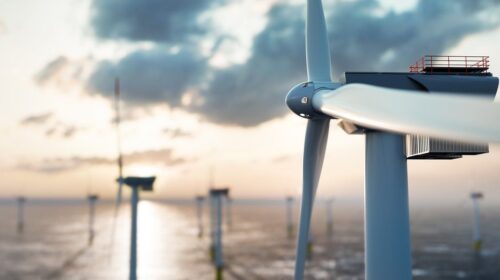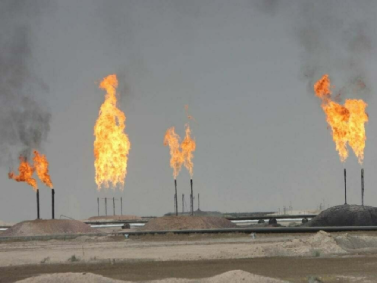Oil slumped as Russia said it was taking steps to “de-escalate” the conflict in Ukraine, while floating the possibility of a meeting between President Vladimir Putin and his Ukrainian counterpart Volodymyr Zelenskiy.
The business secretary has effectively ruled out a windfall tax on North Sea oil firms to fund discounted energy bills but promised much greater investment in solar panels, wind and nuclear to reduce reliance on Russian oil and gas.
Speaking amid reports of a cabinet split over landmark energy security plans due to be published within days, Kwasi Kwarteng offered up a tax on oil companies, backed by Labour, as the one policy that definitely will not find favour with ministers.
“We believe a windfall tax would be a tax on jobs, would destroy investment and would add to the uncertainty in oil markets,” he said. “It would be completely the wrong message to send investors.”
Advertisement
Advertisement
Labour has said the pain inflicted on households by the soaring price of oil and gas could be eased by a tax on the companies that sell it.
But Kwarteng has said such a move would penalise anyone with a pension invested in those companies. “It’s a retro measure which completely doesn’t understand what business is all about,” he said.
Kwarteng, who was answering questions in the House of Commons on Tuesday, was repeatedly asked if the government had further plans to help households struggling to pay their energy bills.
A cap on bills is due to rise by £693 to an average of £1,971 on 1 April, with prices predicted to soar as high as £3,000 at the next price cap increase in October.
Kwarteng said “nobody knows” how high prices will go and pointed only to measures announced in chancellor Rishi Sunak’s spring statement, which has been derided for the limitations of its plan to help people cope with the cost-of-living crisis.
While the business minister said oil firms would not be hit with a windfall tax, he did unveil a pledge to boost renewable energy sources.
The government is aiming to triple the number of solar panels, more than quadruple offshore wind power and double onshore wind and nuclear energy by 2030, in a move that could lower bills for consumers and reduce the UK’s reliance on foreign energy suppliers such as Russia.
Johnson has told the nuclear industry that he wants 25% of electricity generation to come from nuclear power by 2050, up from 16% now.
Johnson’s energy strategy held up over nuclear funding row with Sunak
Read more
Kwarteng put forward the targets as part of Department for Business, Energy and Industrial Strategy (BEIS) plans for inclusion in the upcoming energy white paper.
Advertisement
The paper has faced delays because the cost of approving at least six nuclear power stations as part of an expansion of the UK’s renewable energy strategy has been debated at the Treasury. Ministers are also divided over plans to back onshore wind.
BEIS’s targets include increasing solar power from its current capacity of 14GW to 50GW, offshore wind from 11GW to 50GW, onshore wind from 15GW to 30GW, and nuclear power from 7GW to 16GW, according to the Financial Times.
Solar power and onshore wind generation have, to date, not had official government growth targets.
Earlier this month, Kwarteng said developing the UK’s energy independence was a matter of national security.
Boris Johnson has set out a 10-point plan that includes a target for the UK to get all of its electricity from low-carbon sources by 2035.
The expansion of wind and solar farms is likely to be opposed by some residents and campaign groups.
Sign up to the daily Business Today email or follow Guardian Business on Twitter at @BusinessDesk
Johnson, who has said his personal preference is to expand offshore wind power generation, is considering plans to offer residents affected by the construction of energy farms or nuclear power plants financial incentives to win them over.
On Tuesday, SSE, the electricity generator and network company, upgraded its profit forecasts after changes to weather conditions improved output from its renewable energy generation sources.
The company – which raised adjusted earnings a share from guidance to between 92p and 97p, up from 90p – also said its thermal and hydro plant benefited from the disruption to oil and gas markets as a result of the war in Ukraine.
“SSE’s integrated and balanced business model has performed well in turbulent market conditions,” said the SSE finance director, Gregor Alexander, who added that capital expenditure for the year to the end of March would exceed £2bn.
“Our significant investment programme will make a huge contribution towards both net zero and energy security.”
… we have a small favour to ask. Millions are turning to the Guardian for open, independent, quality news every day, and readers in 180 countries around the world now support us financially.
We believe everyone deserves access to information that’s grounded in science and truth, and analysis rooted in authority and integrity. That’s why we made a different choice: to keep our reporting open for all readers, regardless of where they live or what they can afford to pay. This means more people can be better informed, united, and inspired to take meaningful action.
In these perilous times, a truth-seeking global news organisation like the Guardian is essential. We have no shareholders or billionaire owner, meaning our journalism is free from commercial and political influence – this makes us different. When it’s never been more important, our independence allows us to fearlessly investigate, challenge and expose those in power. Support the Guardian from as little as $1 – it only takes a minute. If you can, please consider supporting us with a regular amount each month. Thank you.





